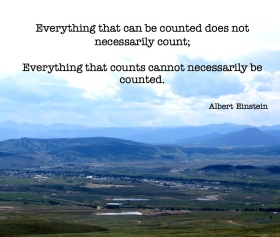Act ion. It’s easy to talk about and easy to describe – “What” we’ve done…. “What’s” keeping us busy. Nice and concrete. Works great for planning, meetings, and status reports.
ion. It’s easy to talk about and easy to describe – “What” we’ve done…. “What’s” keeping us busy. Nice and concrete. Works great for planning, meetings, and status reports.
But as we know, only too well, “Action” doesn’t suddenly appear. Rather, it’s the result of all that has gone on before it, for example time, experience, practice. And it is energized by what lies beneath: desires, intentions, purpose, passion, commitment, courage, to name a few.
A child learns how to walk from the day they are born: moving their bodies and developing coordination, powered by their human desire to move, freely. Likewise, a great soup, epic movies, disruptive innovations, successful companies develop over time. They are initiated by imagining possibilities and are born into life with focused action. Success emerges as the creators’ emotional fortitude moves them forward through the inevitable trials and errors.
Malcolm Gladwell’s, The Tipping Point, explores the range of dynamics behind “Action” by asking key questions. How does it happen? What goes before? What can we see, not see? His conclusion was that small things, seemingly unnoticeable events, create a threshold of critical mass when results appear. This is the Tipping Point. His point? Action + Trust = Results.
In his later book Outliers, Gladwell offered more detail on what it actually takes to move an idea into success. It takes time and practice; in fact, he suggests, it takes 10,000 hours of practicing a specific task to be successful at it. But, alas, just when you might think there is a quantitative path, he describes the importance of cultures, backgrounds, and personal aptitudes. His point here? Lots of Action + Commitment + Conducive Environment = Results.
By now, you might be thinking “Okay, got it…. BUT… How does this work in the midst of organizational life where we plan, forecast, execute and report? Where we don’t talk about “Trust”, where we believe we can push through unfriendly environments and where deadlines are not planned across 20 hours a week for 10 years, but in quarters?”
In fact, imagine you or your manager asking how long a project will take. Would you wonder “Is the Tipping Point ready for success?” Would you calculate whether you or your team are even close to chalking-up 10,000-Hours of competency?
Looking back through my experiences and others’, I have seen a flow between the doing of action and the leveraging of its energizing dynamics. Here’s some starting thoughts.
Leveraging “Action”
- Have a vision. Power the vision with purpose and passion. Begin. Successful action asks us to access the full range of our capacity – our ability to vision and to act. We don’t do just one or the other, we do both. The business guru Stephen Covey puts it like this: “Begin with the end in mind.” Lao Tzu, the ancient Chinese philosopher noted “The journey of 1,000 miles begins with the first step.”
- Be Focused and Curious. Revise often. Irrespective of our vision, we begin with where we are and what we know. So, a determinate of success is watching where it takes us, determining if we are getting what we expected, and being willing to explore new approaches. The actor, filmmaker Vin Diesel put it this way: “… to fulfill your plans, you’ve gotta be resourceful to make sure you can do it.”
- Expect the unexpected. Revel in the challenge. What would it be like to bring our sense of adventure into our work life? After all, Lao Tzu reminds us “Life is a series of natural and spontaneous changes. Don’t resist them – that only creates sorrow. Let reality be reality. Let things flow naturally forward in whatever way they like.” Note, there is no exemption clause for organizations that says “except at work when all will go according to plan and expectations.” So, we might as well be adventurous. Stuff is going to happen. Be in the moment. Do what needs to be done. Keep your eye on the goal.
 Trust the Tipping Point and the 10,000-Hour Rule. Action is important. It’s how we create, implement, succeed. It builds our capacity and competency. We learn what works, what doesn’t. We develop judgement and understanding of what it takes to get things done. And, it moves us to the Tipping Point – the moment the soup is ready, the film is done, sales take off, the project is a success.
Trust the Tipping Point and the 10,000-Hour Rule. Action is important. It’s how we create, implement, succeed. It builds our capacity and competency. We learn what works, what doesn’t. We develop judgement and understanding of what it takes to get things done. And, it moves us to the Tipping Point – the moment the soup is ready, the film is done, sales take off, the project is a success.
Thanks for Reading!
Kathleen